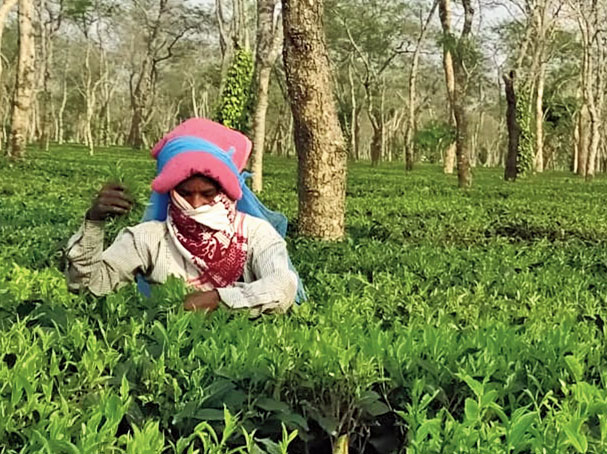The Centre has permitted tea plantations to function during the lockdown period but tacked on a rider that only 50 per cent of the workforce can be engaged for work, stirring apprehensions of local resistance to the plan.
In a letter written to the chief secretaries of the states, including Bengal and Assam, Union home secretary Ajit Bhalla granted the concession as part of the modified consolidated guidelines - the fifth revision in the past 10 days - that determine which operations can remain open during the 21-day lockdown.
Understandably, the tea gardens aren't exactly ecstatic at the prospect of running their operations. They believe that everything will work tickety-boo only if the state government gives them a green light as well and the labour unions and political parties signal their approval.
The production of tea, even at a limited capacity, will greatly benefit 87 gardens in Darjeeling that are at grave risk of losing out their premium first flush production this year.
Just when the gardens in the hills of Bengal were looking forward to an early resumption of operations, local BJP member of Parliament Raju Bista shot off a letter to Union home minister Amit Shah requesting a review of the ministry of home affairs (MHA) concession to the tea gardens.
Bista argued that processing of tea takes place in confined places where there is a high risk of workers contracting Covid-19. He also highlighted that several migrant workers who came back to the hills have contracted the virus and many more could be asymptomatic carriers of the disease.
'…Getting tea garden workers to once again work outside the ambit of (the) lockdown puts them in harm's way,' Bista wrote to Shah a day after the lockdown.
The industry estimates that it could be possible to save 40 per cent of first flush Darjeeling Tea production if the workers return to work from Monday.
The Darjeeling gardens produce about 1.5-1.8 million kg of first flush tea, which contributes 30-35 per cent of their annual revenue. In 2019, the gardens produced close to 7.75 million kg of tea.
An early resumption of work will help restore the fortunes of the north Indian tea gardens spread across the Dooars and Terai region of Bengal and those in Assam and other pockets in the Northeast.
'Over 90 million kgs of teas are produced in north Bengal from March till May (the first and second flush). If the industry remains closed during this period and even if there is no lockdown after the middle of April, we apprehend the industry would lose around 30 million kgs of production. The loss would obviously increase if the lockdown is extended to the monsoon months, that is, May and beyond,' said Amitangshu Chakraborty, principal adviser at the Indian Tea Planters' Association.
As per the data available with the Tea Board of India, the total production in north Bengal in 2019 was 424.06 million kgs. Out of it, 25.10 million kgs were produced in March. Tea production in April and May last year amounted to 23.30 million kgs and 43.35 million kgs, respectively.
While political opposition could stir the pot at the local level, garden owners are not entirely sure that the administrations in Assam and Bengal will explicitly back the MHA guidelines.
Even though the Assam state cabinet has allowed plantations to start operations from April 1, no plucking has begun as the district administrations have not given their formal go-ahead to individuals. The state produces about 100 million kgs of first flush tea.
In Bengal too, the state has only allowed clearing bushes and spraying of pesticides till now. Gardens have started writing to the state administrations seeking their approvals after learning of the MHA concession to the tea plantations.
Asked if Nabanna - the administrative headquarters of Bengal - will approve the plan, a senior official said: 'No decision has been taken as yet on the matter.'
According to one view, formal approval may not be required after the MHA clarification. 'In the first MHA guideline, it was mentioned that continuous process industries must seek approval from the local state administration. The April 3 guidelines do not mention such a requirement as far as tea plantations are concerned,' a tea industry official argued.
Now that the tea gardens have been officially kept out of the lockdown, the owners may try to wriggle out of the commitment to pay wages to workers if they do not turn up.
'They (the absentee workers) can be counted as absent permitting deduction of wage. Alternatively, the gardens can announce a lockout if required,' the official added.











